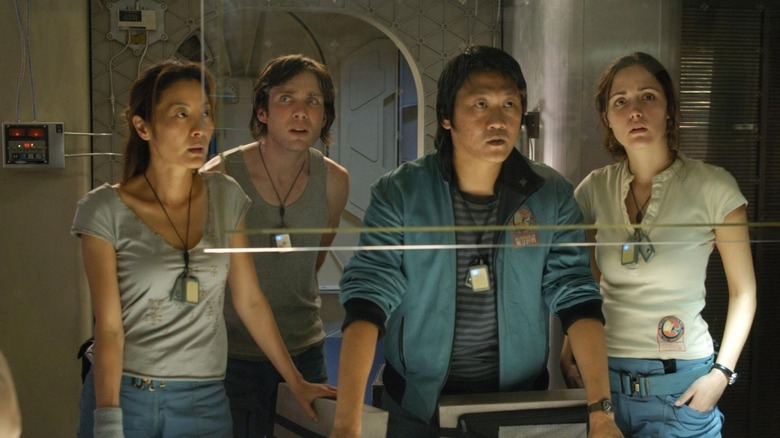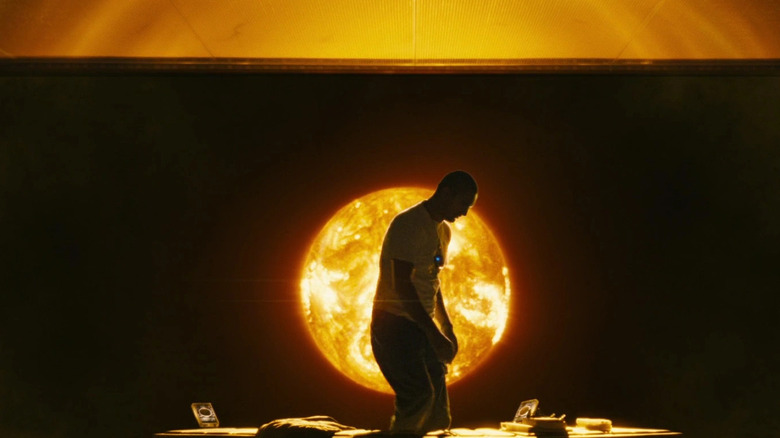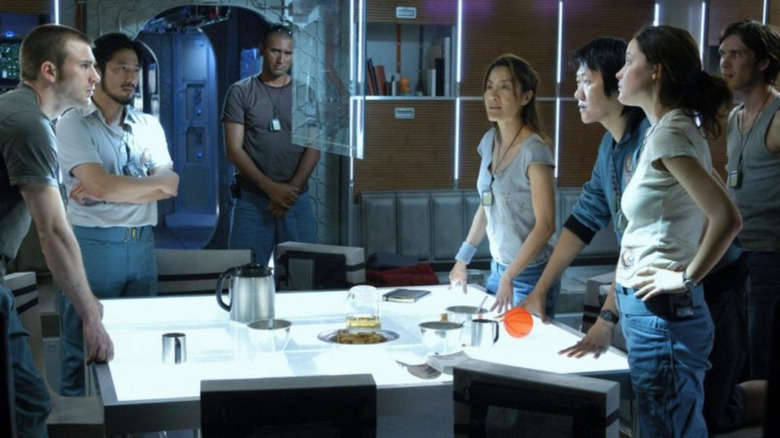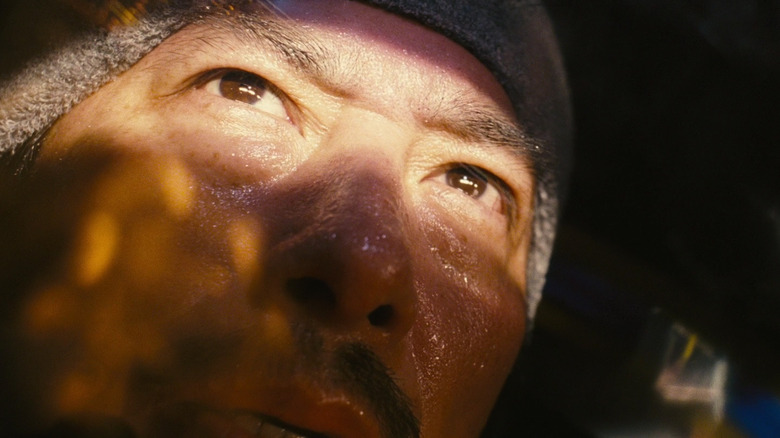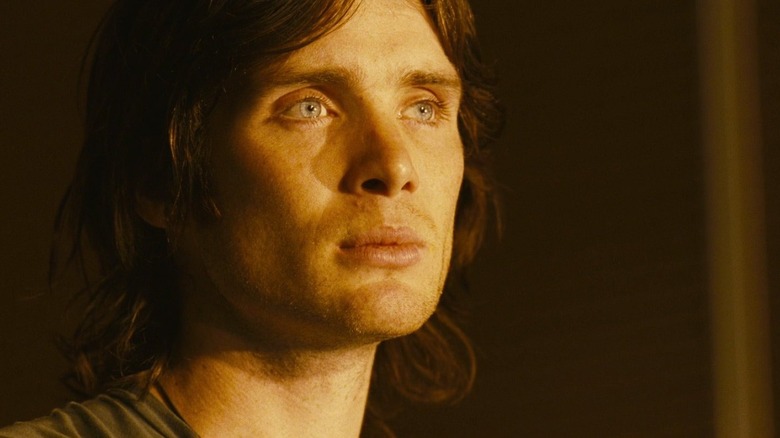How Danny Boyle Immersed The Cast Of Sunshine Into Its World
If Danny Boyle stopped making movies after "Trainspotting," he would have already earned his spot as one of the most influential British directors of all time. Since then, he has developed a reputation as something of a national treasure, winning an Oscar for "Slumdog Millionaire" and overseeing the quirky opening ceremony of the 2012 Olympics in London.
But is he any good? That's something I'm still not sure about. Far too often he favors flash over substance and his stylistic choices are such a mixed bag. At best, his hyperkinetic flourishes serve the material really well. The rapid-fire editing and nightmarish fantasy sequences in his landmark "Trainspotting" put us right inside the skittish psyche of a bunch of Edinburgh junkies, while the special effects and visions of saints employed in "Millions" effectively evoked the rich make-believe world of its child protagonists. At his worst, Boyle's attention-grabbing techniques can overpower a story, as we saw in his poorly received step into Hollywood filmmaking, "A Life Less Ordinary."
While Boyle is one of the most successful British directors of the past 30 years, "Trainspotting" is still his only truly great movie to date. "Sunshine," his creepy underrated sci-fi thriller about a team of scientists sent on a mission to reignite our star, comes tantalizingly close to greatness, but the director's worst tendencies scupper the carefully controlled atmosphere with a silly slasher twist and a visually nonsensical conclusion. It comes as a bit of a letdown, especially after Boyle put in so much hard work getting his cast in the right frame of mind in the first place.
So what happens in Sunshine again?
"Sunshine" is set in a not-too-distant future where our sun is dying out, threatening mankind's existence on Earth. As a last resort, a small crew is sent on a rescue mission on the Icarus II, piloting a massive bomb towards our star in the hope of kickstarting it again. As the ship's name suggests it isn't the first mission of its kind: Icarus I mysteriously vanished several years earlier.
The team initially seem like a tight-knit, level-headed bunch. Among them is Robert Capa (Cillian Murphy), the melancholic physicist in charge of the bomb and the only member of the crew who fully understands its vast capabilities; James Mace (Chris Evans), a straight-talking and uncompromising engineer willing to make tough decisions to get the mission over the line; Corazon (Michelle Yeoh), the craft's benevolent botanist tasked with managing the onboard garden that provides vital oxygen; Kaneda (Hiroyuki Sanada), the ship's courageous captain; and Searle (Cliff Curtis), the doctor who becomes hooked on exposure to the sun's beautiful yet deadly rays.
Screenwriter Alex Garland gives us a very relatable bunch of protagonists before steadily piling on a series of disasters that puts the mission in grave peril and decimates the crew, before pulling out an eerie twist. The Icarus II picks up a signal from its predecessor. Our crew now faces a difficult choice: Do they divert from their course, potentially putting their mission at risk, or carry on regardless?
Does Sunshine still hold up?
"Sunshine" excels in its quieter moments, building a believable dynamic between the crew and using small details to create an atmosphere of creeping unease. These guys feel like they are genuinely very far away from Earth and the slightest error could not only spell doom for them and the ship, but for mankind as a whole. The design of the Icarus II is fantastic, and subtle sound effects give a palpable sense of the vast deadly void of outer space just outside its hull.
The decision to include the Icarus I diversion initially seems like a good idea, adding a painful dilemma to the narrative while also upping the spookiness of the story. It is already unnerving enough to see how the sun's rays have such a powerful effect on certain individuals, but the notion that the previous mission's crew fell foul of its hypnotic influence adds a feeling of inevitability to the subsequent horror.
Things go off the rails with the introduction of Pinbacker (Mark Strong), the captain of Icarus I who has somehow survived and has been driven insane by years of exposure to the sun. We don't get a direct look at him, but he looks pretty crispy, recalling a certain slasher icon of the '80s. There is already enough peril and drama with the crew just trying to deliver their payload, but the diversion into horror territory cheapens the film. The final showdown, where optics and reality are warped by proximity to the sun's surface, is so stylized that it is virtually incomprehensible. I can see what Boyle is trying to do, but I just wish he had shown a similar restraint to the rest of the film.
Danny Boyle wanted his cast to feel like crewmates
After his previous output, Danny Boyle might not have seemed like the obvious choice to helm a science fiction movie, but he had some serious thoughts about what makes a classic of the genre (via The Guardian):
"There are two branches of sci-fi, really — there's the fantasy sci-fi, which is about the creatures, so that's 'Star Wars' and that kind of thing, where anything goes. And then there's a much narrower corridor, in which there are the films that we regard as the great masterpieces, such as '2001,' the Tarkovsky 'Solaris' and the first 'Alien' film. They break down, really simply, to a ship, a crew, a signal."
Accordingly, Boyle went to great lengths to get his cast into the headspace of the crew. Although the film features some impressive special effects for a science fiction adventure with a relatively low budget, the focus is mainly on a small group of characters pulled apart by the enormity of their mission.
Working with an excellent ensemble cast, Boyle gathered his players in a dormitory at the University of East London to encourage their group dynamic to develop convincingly (via SciFi Now). Hiroyuki Sanada, who also starred in the far less believable sci-fi horror movie "Life," recalled:
"We had small rooms, no TV, no refrigerator but a shared kitchen and every night one of us had to cook for everyone... That rehearsal period helped create the atmosphere that we'd spent a long time in this spaceship together. We created that sense of teamwork already. On-set we just lived and breathed the role as Danny wanted to create the realism of living there as a character."
Danny Boyle dropped the ball in the Sunshine finale
To demonstrate the kind of claustrophobic suspenseful atmosphere he was going for, Danny Boyle also showed his cast "Alien," "Das Boot," and "The Wages of Fear," the taut classic that also featured a small group of characters transporting an explosive payload. Other activities that he hoped would add to the film's authenticity included scuba diving to experience weightlessness and flight simulator training (via The Guardian).
For the science aspect, Boyle drafted in physicist Dr. Brian Cox, who also worked closely with Cillian Murphy to help him develop his character. Cox later praised Murphy's portrayal, while the actor was so affected by his time making the film that he switched from agnosticism to atheism (via Contact Music). Regarding the conclusion, the director had very commendable reasons for the visual trickery he deploys in the final moments:
"Nobody, no matter how brilliant they are, understands what would happen if a human being could get that close, at those sorts of velocities and being pulled into the sun. So you have carte blanche in terms of what actually is happening... you try to get trippy enough so that you can justify a man putting his hand up and touching the sun, which is what we wanted to achieve at the end."
It's obvious that Boyle is going for his "Stargate in '2001: A Space Odyssey'" moment in the final sequence, but it is far too chaotic to hit home. In a perfect version of the film, we'd cut out all the chase nonsense with Pinbacker and just end with Capa reaching for the sun as his civilization-saving bomb ignited. Cillian Murphy's eyes are a special effect all on their own, and their depths of sadness and wonder would have told us all we needed to know.
